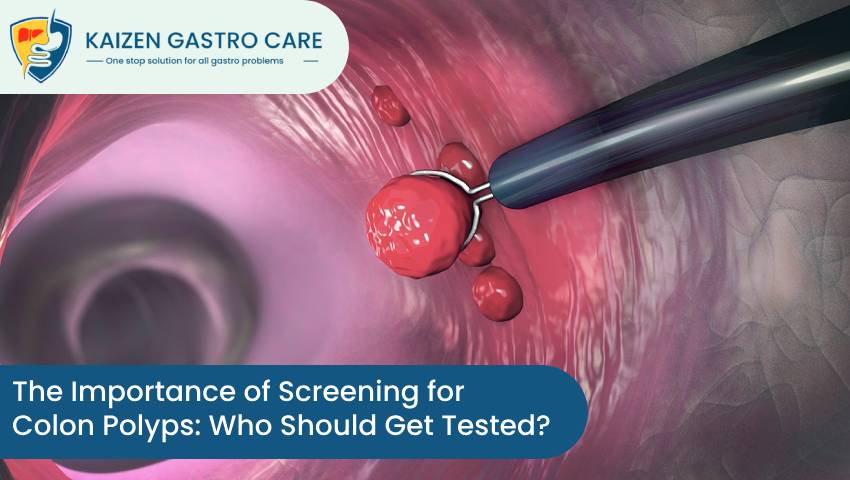
- 22/05/2024
- Kaizen Gastro Care
- 0 Comments
- Proctology
The Importance of Screening for Colon Polyps: Who Should Get Tested?
Colon polyps, small bumps of cells that form on the lining of the colon, are often harmless but can develop into colorectal cancer if left unchecked. Regular screening for colon polyps is essential in preventing this progression and providing early detection and treatment.
At Kaizen Gastro Care Clinic, we emphasize the importance of understanding who should get tested and why early screening is a crucial component of maintaining gastrointestinal health. Our expert, Dr. Samrat Jankar is the best colorectal cancer specialist in Pune, Maharashtra.
What are Colon Polyps?
Imagine tiny bumps lining the inner walls of your colon. These are colon polyps, and most are harmless, meaning they’re not cancerous.
However, Colon polyps come in various types, including adenomatous (which can become cancerous), hyperplastic (generally benign), and inflammatory (often associated with conditions like ulcerative colitis or Crohn’s disease). While not all polyps are dangerous, their presence can be an early indicator of colorectal cancer risk.
Why Screen for Colon Polyps?
Colon polyps are abnormal growths that form on the inner lining of the colon. Most polyps are noncancerous. However, some, particularly adenomatous polyps, have the potential to turn cancerous over time. Early detection and removal of polyps can significantly decrease your risk of developing colorectal cancer.
Here’s how colon polyp screening benefits you:
- Early detection: Early-stage colon cancer usually has no symptoms. Regular screening can detect polyps before they become cancerous, allowing for more comfortable and more successful treatment.
- Reduced risk of cancer: Removing polyps significantly lowers your chances of developing colorectal cancer.
- Improved survival rates: Early-stage colorectal cancer has a much higher survival rate compared to later stages.
- Peace of mind: Knowing you’re taking proactive steps towards your health can provide significant peace of mind.
- Early Cancer Detection: If cancer is present, early detection offers a much higher chance of successful treatment.
Who Should Get Screened for Colon Polyps?
The age at which screening is advised depends on your individual risk factors. Here’s a general approach:
- Average Risk: Starting at age 45 is advised for people with an average risk of colorectal cancer. This includes those with no personal or strong family history of the disease.
- Family History and Genetics: Individuals with a family history of colorectal cancer or polyps are at higher risk and may need to start screening earlier. Genetic conditions like Lynch syndrome or familial adenomatous polyposis also increase risk and necessitate more frequent and earlier screenings.
- Personal Medical History: Individuals with a history of inflammatory bowel disease, such as Crohn’s disease or ulcerative colitis, should undergo regular screenings. Previous occurrences of polyps or colorectal cancer also necessitate alert monitoring.
- Lifestyle Factors: Lifestyle preferences can impact colon health. Factors such as smoking, heavy alcohol use, obesity, and a diet high in red or processed meats increase the risk of developing polyps. Individuals with these risk factors should discuss screening options with their healthcare provider.
It’s important to discuss your risk factors with your doctor to choose the most appropriate screening schedule for you.
Types of Screening Tests:
Dr. Samrat Jankar uses several screening methods, each with its own benefits:
- Colonoscopy: The most comprehensive test, allowing for the detection and removal of polyps during the procedure.
- Fecal Immunochemical Test (FIT): Detects hidden blood in the stool, which can be a symptom of polyps or cancer.
- Flexible Sigmoidoscopy: Analyzes the lower part of the colon and rectum.
- CT Colonography (Virtual Colonoscopy): Uses CT scans to produce images of the colon and rectum.
- Stool-Based Tests: Includes fecal immunochemical tests (FIT) and stool DNA tests that detect symptoms of cancer.
Taking Control of Your Health:
Early detection of colon polyps is crucial in preventing colorectal cancer. By understanding your risk aspects and the importance of screening, you can take a proactive approach to your health. Here are some key takeaways:
- Talk to Dr. Samrat Jankar about your risk factors for colorectal cancer.
- Don’t ignore the suggested screening age, even if you feel healthy.
- Discuss available screening options with your doctor and choose the one that’s right for you.
- Early detection is key! Don’t delay scheduling your screening test.
By taking these steps, you can significantly decrease your risk of developing colorectal cancer and live a longer, healthier life.
Conclusion:
At Kaizen Gastro Care, the best gastroenterology clinic, we are committed to providing the highest standard of care for our patients. Regular screening for colon polyps is a proactive step in maintaining gastrointestinal health and preventing colorectal cancer. If you fall into any of the high-risk categories or are over the age of 45, we encourage you to schedule a screening. Early detection can save lives, and our team is here to support you every step of the way.
For more information on colon polyp screening or to schedule an appointment, please contact Kaizen Gastro Care Clinic at 09763635252. Your health is our priority, and we are dedicated to helping you achieve and maintain optimal gastrointestinal health.
